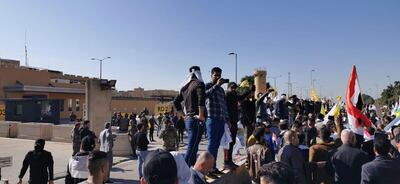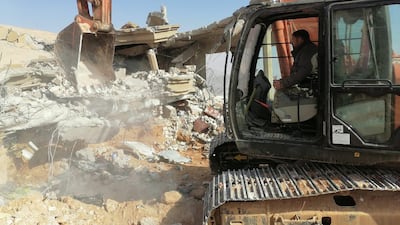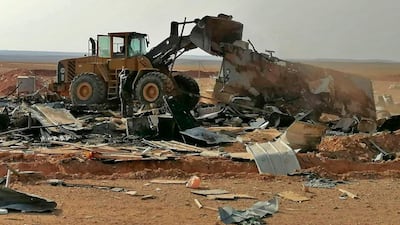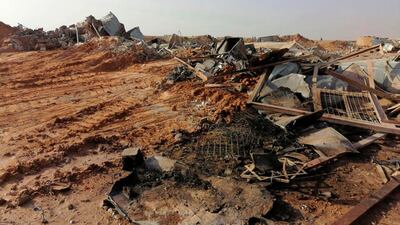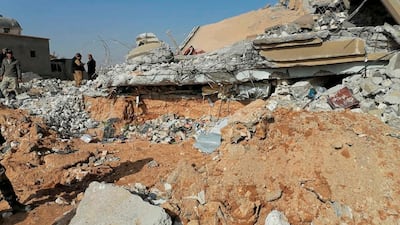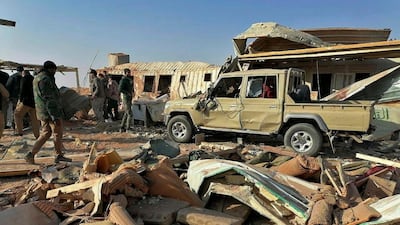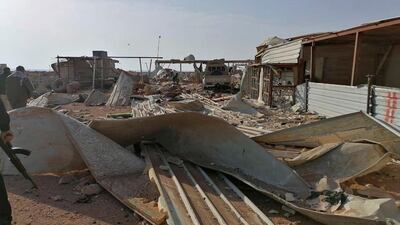Hundreds of supporters and members of Iraq's Kataib Hezbollah militia chanting "death to America" breached the outer compound wall of the US embassy in Baghdad and set it on fire on Tuesday, in an attack President Donald Trump blamed on Iran, which he said would pay a "high price".
The pro-Iranian militia supporters gathered in response to deadly air strikes by the US that killed 25 of the Iran-backed Shiite militia's fighters in Iraq.
Mourners held funerals in a Baghdad district for those killed and then marched to the embassy in the heavily fortified Green Zone.
The protest quickly escalated as the crowd ignored calls by US forces for them to fall back and tear gas was fired to disperse them.
It is the first time in years that a protest has reached the embassy, which lies behind a series of checkpoints. The zone is off-limits to ordinary people.
Mr Trump responded angrily and said he expected Iraq to use its forces to protect the American compound. He also blamed Iran for organising the attack.
"Now Iran is orchestrating an attack on the US Embassy in Iraq. They will be held fully responsible," he said on Twitter.
He later added: "The U.S. Embassy in Iraq is, & has been for hours, SAFE! Many of our great Warfighters, together with the most lethal military equipment in the world, was immediately rushed to the site. Thank you to the President & Prime Minister of Iraq for their rapid response upon request.
"Iran will be held fully responsible for lives lost, or damage incurred, at any of our facilities. They will pay a very BIG PRICE! This is not a Warning, it is a Threat. Happy New Year!"
A spokesman for Kataib Hezbollah said the militia's supporters intended to lay siege to the embassy until it was shut down and US diplomats left Iraq.
The US State Department said all personnel at the embassy were safe and there were no plans to evacuate the compound.
Ambassador Matt Tueller, who had been away on "personal travel", was returning to the embassy, a spokesperson said.
Defence Secretary Mark Esper said the Pentagon was sending around 750 extra soldiers to Baghdad to provide security for the embassy.
The State Department also made a distinction between the militia fighters and supporters who attacked the embassy and Iraqis who have been protesting against the government for months.
"Iranian-backed demonstrations in front of the US embassy should not be confused with the Iraqi protesters who have been in the streets since October to decry the corruption exported to Iraq by the Iranian regime," it said.
Mr Trump offered encouragement to the protesters in a later tweet.
"To those many millions of people in Iraq who want freedom and who don’t want to be dominated and controlled by Iran, this is your time," he said.
Among the crowd at the embassy were Qais Al Khazali, head of the Iran-backed Asaib Ahl Al Haq militia; Hadi Al Amiri, Badr militia leader; and Abu Mahdi Al Muhandis, a commander in the Popular Mobilisation Forces.
The three are regarded as Tehran's right-hand men in Iraq.
The PMF is an umbrella group of paramilitary entities that was formally integrated into Iraq's armed forces during the fight against ISIS.
Most of the militia in the group are backed by Iran.
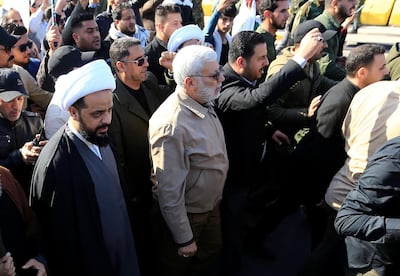
Iraq's Interior Minister, Yassin Al Yasiri, and other politicians were also seen near the embassy.
Caretaker Prime Minister Adel Abdul Mahdi called on the crowd to leave.
"Any aggression against foreign embassies would be stopped by security forces and punished harshly in law," Mr Abdul Mahdi said.
Later Mr Trump spoke to Mr Abdul Mahdi about security issues and emphasised the need for US personnel and facilities in Iraq to be protected, Reuters reported.
The attack came as US Secretary of State Mike Pompeo spoke with leaders in the Middle East on Monday to discuss the American air strikes.
Mr Pompeo spoke with Sheikh Mohamed bin Zayed, Crown Prince of Abu Dhabi and Deputy Supreme Commander of the UAE Armed Forces, Saudi Arabia's Crown Prince Mohammed bin Salman and Israeli Prime Minister Benjamin Netanyahu, the US State Department said.
The Saudi Press Agency said Prince Mohammed and Mr Pompeo "discussed a number of regional and international developments, as well as efforts to enhance security and stability in the region".
The Pentagon said on Monday that it struck five Kataib Hezbollah sites in Iraq and Syria in response to a rocket attack on a military base in Kirkuk that killed an American civilian contractor and wounded four soldiers.
At least 55 militia fighters were wounded in the strikes.
Riyadh on Tuesday condemned the attacks launched last week by Iran-backed militias against American forces in Iraq, the Saudi Press Agency reported.
Earlier on Monday, Mr Pompeo said in a call with UN Secretary General Antonio Guterres that the strikes "were aimed at deterring Iran", the State Department said.
Mr Abdul Mahdi said the air strikes could plunge the country further into the heart of a proxy conflict between the US and Iran.
"The prime minister described the American attack on the Iraqi armed forces as an unacceptable, vicious assault that will have dangerous consequences," his office said.
Baghdad said it would summon the US ambassador while Washington responded by accusing Iraqi authorities of having failed to protect US interests.
Also on Monday, Mr Al Muhandis pledged to retaliate.
"We will hold America accountable and will not stay silent on what has happened. The administration in Washington cannot possibly think that they control Iraq," he said.
About 400 people in Basra protested against the air strikes on Monday in a show of support for the militias. Counter-protests were held applauding the US action.
Mr Pompeo said Washington may take "additional action" in the region.
Iraq has been caught in the middle of escalating tensions between the US and Iran, which are its main allies.
Relations between Washington and Tehran have deteriorated since the US in 2018 pulled out of the landmark Iran nuclear deal in 2018.






















